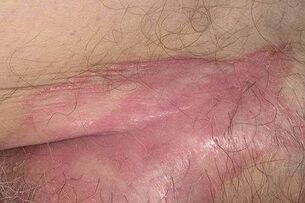Psoriasis is one of the most severe dermatological diseases. The pathology is autoimmune and cannot be cured and occurs in patients of all ages. The characteristic of this disease is its wavy nature. Relapse is followed by periods of calm and vice versa. The duration of remission always depends on the type, form of the disease, as well as the individual characteristics of the patient.

The main symptoms of psoriasis are unpleasant pink or red spots that appear on various parts of the human body. In medical practice, such rashes are commonly referred to as plaques or papules. In most cases, the plaque is covered with a scale of pathological features and rises above the surface of healthy skin by a few millimeters. Also, the symptoms of psoriasis include symptoms such as severe itching in the area of the lesion and inflammation.
Psoriasis, the cause of which has not been explained, is diagnosed in every tenth person who consults a doctor with skin problems. Pathology often occurs in adults, but is often found in children. At risk are residents of countries with cold and humid climates. The percentage of disease in people in cold countries is higher than among the population living in warm climates.
What is psoriasis: the theory of the origin of the disease
Until now, it has not been possible to know exactly the cause of this disease, how psoriasis started is also unclear. Even the combined efforts of world scientists do not allow to answer the question of why psoriasis appears? According to Wikipedia, in modern medical practice, there are several theories about the occurrence of this disease. However, none is officially supported. Theories for the development of psoriasis include the following:
- Immunity.
- Descendants.
- Hormone disorder theory.
- Theory with a background of stress.
- Disorders of metabolic processes.
- Virus origin.
Based on clinical studies and laboratory data, scientists can identify several points of view that indicate possible causes of pathological development.
Immunity theory
Many scientists determine the cause of psoriasis in children and adults with the characteristics of the immune system. This theory is the most widespread. From the point of view of its founder, the appearance of plaques on the body with different properties occurs as a result of the activity of immune cells, which consider certain areas of the dermis as invaders. The result of this is strong inflammation and redness of the skin.

The causes of psoriasis on the body from an theoretical point of view can be as follows:
- rubbing leather with clothing and shoes;
- is on fire;
- inflammation;
- mikrokrok;
- calar.
According to the test results, it is possible to identify the presence of a large number of immune cells in the places where psoriatic spots appear. This is a partial confirmation of immune theory.
Genetic theory
Another name is hereditary theory. Many scientists think that the disease is inherited. This is evidenced by many surveys, the results show that in the case of pathology in the mother, the risk of contracting the disease in the child is 20-25%. If both parents suffer from psoriasis, the percentage increases to 75.
Genetic predisposition is considered to be one of the major factors in the development of this disease. With a combination of several provoking factors, the risk of pathology increases significantly.
Important! If the child's parents are sick with psoriasis, this can not guarantee one hundred percent that the child will definitely suffer from the same disease. Heredity only increases the risk of disease.
Endocrine Theory
The causes of psoriasis on the hands, back, head and other parts of the body are also explained in part by endocrine theory. Here, scientists show that pathological changes in the dermis occur due to hormonal imbalances in the body. Normal functioning of the endocrine system causes a decrease in the vital activity of healthy dermis cells.
Hormonal imbalances can occur for the following reasons:
- gestation period;
- menstruation;
- taking hormone medication;
- puberty.
Important! According to the results of medical research, violations of hormone levels in patients' blood are not observed in all cases. Given these facts, the endocrine system cannot be considered fundamental.
Neurogenic theory
The onset of psoriasis also supports neurogenic theory. This view explains the emergence of disease due to stress and strong emotional experiences. Representatives of this theory believe that the cause of the appearance of psoriasis may lie in damage to the central nervous system.

As a result of experience, patients experience phenomena such as vascular wall neurosis. This provokes narrowing of the vascular muscles and impaired blood flow. The result is the appearance of a rash on the body in the form of scaly plaques.
According to a survey in more than half of all psoriasis patients, the onset of the disease is preceded by intense experience and stress.
Theory of exchange
Causes of psoriasis in women and men can also be caused by violations of metabolic processes in the body. This is the opinion of a representative of the theory of metabolic disorders.
Medical research has found a clear link between psoriasis and metabolic disorders in the body. Violations of lipids and other processes lead to changes in blood composition, decreased immunity and other negative consequences.
The following factors can trigger metabolic disorders:
- diabetes mellitus;
- kidney, liver disease;
- unbalanced diet;
- inactive lifestyle.
Virus theory
Some scientists explain the causes of psoriasis with the transmission of viral infections or the presence of chronic inflammatory foci in the body. This theory has to do with genetics. Representatives from this point of view believe that infection can be an impetus for the development of pathology.
What factors can trigger psoriasis?
In addition to theories about the origin of the disease, there are several provoking factors. These include:
- Unhealthy diet, eating food allergens, insufficient amounts of vitamins and minerals.
- Bad habits like alcohol and cigarettes, as well as taking drugs.
- Improper medication or timely cancellation of medication.
- Various injuries to the dermis.
- Hormonal imbalance in the body.
Heredity and a combination of several provoking factors can cause diseases such as psoriasis. It is very important to diagnose the pathology in a timely manner and begin adequate treatment. This will help avoid many negative consequences in the future.
Why psoriasis is dangerous
At first, the disease may not cause much discomfort, but if left untreated, the disease will worsen with persistent relapse. Therefore, it is important to start treatment in a timely manner and prevent the development of psoriasis. As a precautionary measure, you can use traditional medicine and its methods, but only with the consent of a doctor.
Now that you know what causes psoriasis, you need to start overcoming it. At the first symptom, see your doctor, self-medication can endanger your health.























